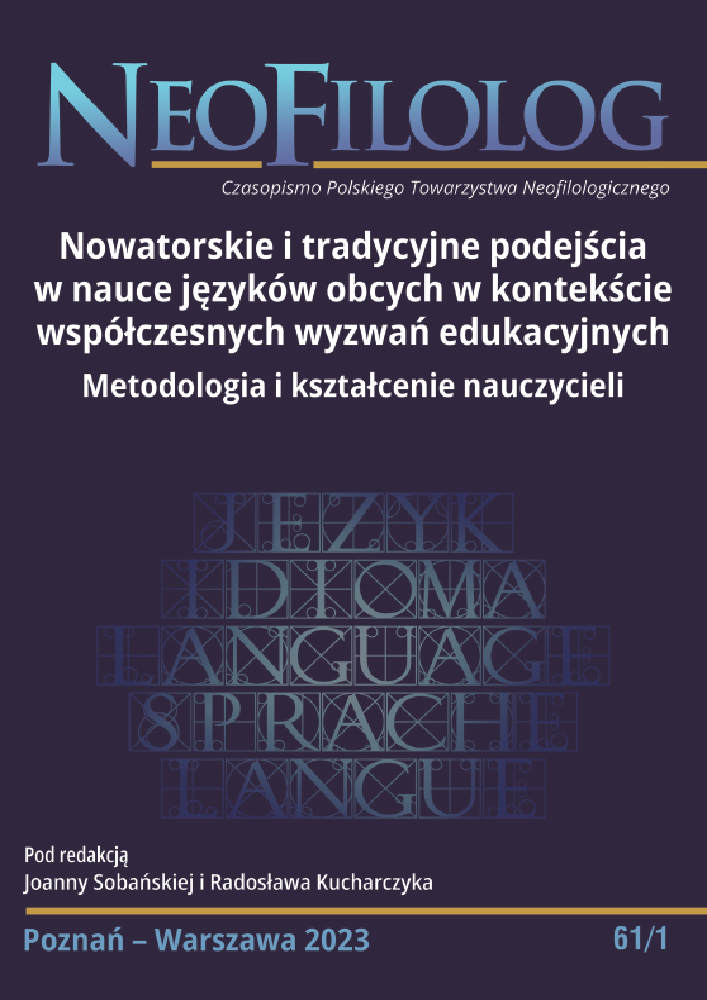Abstract
While studies on interpretative repertoires have been conducted in SLA, this is still a fairly new topic with regard to language teachers. Due to various contextual differences, teachers’ interpretative repertoires change, which also seems a sufficient reason why they should be investigated on a regular basis. The aim of this study is to identify and analyse Polish in-service teachers’ (n=48) interpretative repertoires concerning language which emerged in the teachers’ discourses in the context of their taking a promotion examination. Acknowledging the complexity of this issue, interpretative repertoires, including the SLA studies devoted to identifying them, are first discussed, followed by a description of the study. In terms of methodology, the author’s field notes for data collection were used. The data were coded following the content analysis approach, and 6 conceptualizations of language emerged: language as system, language as communication, language as culture, but also as translanguaging, as preparation for exam, and as life preparation. The findings can be used to adopt new directions in future research on Polish teachers’ language-based interpretative repertoires. The study may also provide information for school policies and practice.
Literaturhinweise
Adamson M. (2014), Reflexivity and the construction of competing discourses of masculinity in a female-dominated profession. “Gender, Work and Organization”, Vol. 2, No 6, pp. 559–572. DOI: https://doi.org/10.1111/gwao.12058
Barkhuizen G. (2010), An extended positioning analysis of a pre-service teacher’s better life small story. “Applied Linguistics”, Vol. 31, No 2, pp. 282–300. DOI: https://doi.org/10.1093/applin/amp027
Edley N. (2003), Analysing masculinity: Interpretative repertoires, ideological dilemmas and subject positions, (in:) Wetherell M., Taylor, S., Yates S. (eds.), Discourse as data: A guide for analysis. London: Sage Publications Ltd, pp. 189–228.
Gilgun J.F. (2020), Writing up qualitative research, (in:) Leavy P. (ed.), The Oxford handbook of qualitative research. Oxford: Oxford University Press, pp. 985–1011. DOI: https://doi.org/10.1093/oxfordhb/9780190847388.013.36
Harrison A.K. (2020), Ethnography, (in:) Leavy P. (ed.), The Oxford handbook of qualitative research. Oxford: Oxford University Press, pp. 329–358. DOI: https://doi.org/10.1093/oxfordhb/9780190847388.013.20
Jolanki O., Jylha A., Hervonen A. (2000), Old age as a choice and as a necessity. Two interpretative repertoires. “Journal of Aging Studies”, Vol. 14, No 4, pp. 359–372. DOI: https://doi.org/10.1016/S0890-4065(00)80002-X
Kalaja P. (2016), Student teachers’ beliefs about L1 and L2 discursively constructed: A longitudinal study of interpretative repertoires, (in:) Kalaja P., Barcelos A.M.F., Aro M., Ruohotie-Lyhty M. (eds), Beliefs, agency and identity in foreign language learning and teaching. Basingstoke: Palgrave Macmillan, pp. 97–123. DOI: https://doi.org/10.1057/9781137425959_6
Lee M., Ong, Y.H., Martiminakis M.A. (2020), Understanding decision-making in interprofessional team meeting through interpretative repertoires and discursive devices. “Journal of Interprofessional Care”, Vol. 35, No 2, pp. 164–174. DOI: https://doi.org/10.1080/13561820.2020.1732889
Pirhonen H. (2021), Towards multilingual competence: examining beliefs and agency in first year university students’ language learner biographies. “The Language Learning Journal”, Vol. 50, No 5, pp. 613–626. DOI: https://doi.org/10.1080/09571736.2020.1858146
Potter J. (1996), Representing reality: Discourse, Rhetoric and Social Construction. London: Sage. DOI: https://doi.org/10.4135/9781446222119
Potter J. (1998), Discursive social psychology: From attitudes to evaluations. “European Review of Social Psychology”, Vol. 9, pp. 233–266. DOI: https://doi.org/10.1080/14792779843000090
Potter J., Wetherell M. (1987), Discourse and Social Psychology: Beyond Attitudes and Behaviour. London: Sage.
Richards, J.C., Lockhart C. (1999), Reflective teaching in second language classrooms. Cambridge: Cambridge University Press.
Ruohotie-Lyhty M. (2016), Dependent or independent: the construction of the beliefs of newly qualified foreign language teachers, (in:) Kalaja P., Barcelos A.M.F., Aro M., Ruohotie-Lyhty M. (eds), Beliefs, agency and identity in foreign language learning and teaching. Basingstoke: Palgrave Macmillan, pp. 149–171. DOI: https://doi.org/10.1057/9781137425959_8
Szumiec M. (2017), System awansu zawodowego nauczycieli. Ocena kluczowego elementu reformy edukacji. Kraków: Impuls.
Werbińska D. (2017), A teacher-in-context: Negotiating professional identity in a job promotion examination. “Apples – Journal of Applied Language Studies”, Vol. 11, No 2, pp. 103–123. DOI: https://doi.org/10.17011/apples/urn.201708233541
Werbińska D. (2022), In-service language teachers’ examination discourses: Interpretative repertoires and positioning. Słupsk: Wydawnictwo Naukowe Akademii Pomorskiej w Słupsku.
Zembylas M., Charalambous P., Charalambous C. (2011), Teachers’ emerging stances and repertoires towards reconciliation: potential and challenges in Greek-Cypriot education. “Journal of Peace Education”, Vol. 8, No 1, pp. 19–36. DOI: https://doi.org/10.1080/17400201.2011.553378
Lizenz
Copyright (c) 2023 Dorota

Dieses Werk steht unter der Lizenz Creative Commons Namensnennung - Keine Bearbeitungen 4.0 International.
Autoren:
Die Autoren der zur Veröffentlichung in der Zeitschrift Neofilolog angenommenen Texte sind verpflichtet, den Vertrag über die Erteilung einer kostenlosen Lizenz für die Werke mit der Verpflichtung zur Erteilung einer Sublizenz CC auszufüllen, zu unterzeichnen und an die Adresse der Redaktion zurückzusenden.
Gemäß Vertrag erteilen die Autoren auf die in der Zeitschrift Neofilolog veröffentlichten Texte der Adam-Mickiewicz-Universität in Poznań eine nicht exklusive und kostenlose Lizenz und erlauben die Verwendung der Sublizenz Creative Commons Attribution-NoDerivatives 4.0 International (CC BY-ND 4.0).
Die Autoren behalten das Recht zur weiteren freien Verfügung über das Werk.
Benutzer:
Interessierte Onlinebenutzer dürfen die seit 2017 veröffentlichten Werke unter folgenden Bedingungen nutzen:
- Anerkennung der Urheberschaft - die Verpflichtung, zusammen mit dem verbreiteten Werk Informationen über die Urheberschaft, den Titel, die Quelle (Links zum Originalwerk, DOI) und die Lizenz selbst bereitzustellen;
- ohne Schaffung abgeleiteter Werke - das Werk muss in seiner ursprünglichen Form erhalten bleiben, ohne Zustimmung des Autors dürfen keine Studien, beispielsweise Übersetzungen, verbreitet werden.
Die Urheberrechte aller veröffentlichen Texte sind vorbehalten.
Sonstige:
Die Adam-Mickiewicz-Universität in Poznań behält das Recht auf die Zeitschrift als Gesamtheit (Layout, Grafik, Titel, Umschlagsprojekt, Logo usw.).

